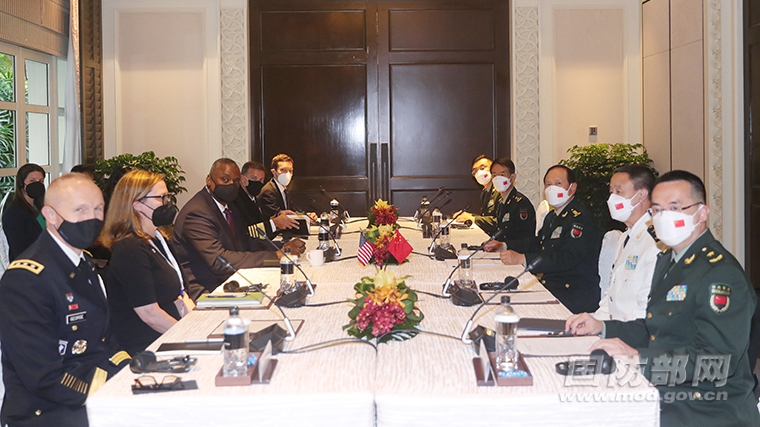
Chinese State Councilor and Minister of National Defense Wei Fenghe (3rd R) and U.S. Defense Secretary Lloyd Austin (3rd L) hold talks in Singapore, June 10, 2022. [Photo/China's Ministry of National Defense]
Rabi Sankar Bosu
During his meeting with his U.S. counterpart Lloyd Austin on the sidelines of the 19th Shangri-La Dialogue security summit in Singapore on June 10, China's State Councilor and Minister of National Defense General Wei Fenghe blasted the United States for playing the "Taiwan cards" after the U.S. announcement on arms sales to China's Taiwan region that once again has questioned the basics of sacrosanct one-China principle. Despite China's persistent protests, U.S. President Joe Biden's fourth arms package to the Taiwan region is the latest example of his administration's desire to contain China's rise by roiling cross-strait relations.
Notably, on June 8, the U.S. Defense Security Cooperation Agency (DCSA) announced a $120 million arms sale package to the Taiwan region. Highlighting Chinese warships' "increased activities" in the waters and airspace around Taiwan, the DCSA stated that the proposed sale will "contribute to the sustainment of the recipient's surface vessel fleet, enhancing its ability to meet current and future threats."
Quite justifiably, the arms sales to the Taiwan region provoked strongly-worded protests from China's government and media. The Chinese government and people have long viewed the U.S.' continuing selling weapons to the Taiwan region as hostile and aimed at challenging the country's territorial integrity.
Thus, it is entirely reasonable for the Chinese defense minister slamming the U.S. Taiwan policy by stating that "the People's Liberation Army will relentlessly safeguard China's sovereignty and territorial integrity, and if anyone dares to separate Taiwan from the motherland, the Chinese military will definitely smash such attempts at any cost, even by going to war."
Needless to say, the latest arms sale to the region will have an adverse impact on the cross-strait peace development as well as the Sino-U.S. ties which have been at an all-time low resulting from an unfair "trade war" against the world's second largest economy started by the former U.S. President Donald Trump's administration.
Since enacting the Taiwan Relations Act (TRA) on April 10, 1979 signed by President Jimmy Carter, the U.S.' "defensive" arms sales to Taiwan again and again has raised the question of how sincerely the U.S. treats the one-China principle which proclaims the Taiwan region is an inalienable part of China, the three China-U.S. joint communiques, and how much it respects China's core interests.
Truly speaking, the U.S. arms sales to China's Taiwan as well as providing training to troops there by the U.S. forces are a distinct interference in China's domestic affairs on the part of the U.S. presidents that are instigating support for "Taiwan independence" forces.
The U.S. administration throughout different presidencies has been provoking China by frequent sales of weapons to Taiwan that undermines one of the most important bilateral ties in the world.
Following the footsteps of former presidents, President Biden vigorously said during a joint news conference with Japanese Prime Minister Fumio Kishida on May 23 that his country will "militarily intervene" in case China attempts to take Taiwan by force, prompting Chinese State Council's Taiwan Affairs Office to criticize him for "playing with fire."
Being baffled by China's rise as an effective world power, the United States with the aim to preserve its own hegemony across the world openly described China as "rival." America's gross interference in China's internal affairs has become more evident from trade restrictions to selling arms to Taiwan, from encouraging independence forces in the region to signing the 2018 "Taiwan Travel Act" into law, from sending U.S. officials to Taiwan to launching the "U.S.-Taiwan Initiative on 21st-Century Trade," to list a few.
Although the three China-U.S. joint communiques and the so-called Taiwan Relations Act do not recognize Taiwan region as a separate nation, the United States with an aim to challenge China's sovereignty has continued to extend economic support and arms sale to the Democratic Progressive Party (DPP) authorities, thus, brewing tensions between the world's two largest economies. The peaceful development of cross-strait relations has largely remained cold due to DPP leader Tsai Ing-wen's stubborn refusal to acknowledge the 1992 Consensus which is an important political foundation to maintain stable cross-strait relations.
There is no doubt that the United States and China bear heavy responsibilities not only to their own people but to the world at large. The China-U.S. relationship should still be led by mutually beneficial cooperation, and feature healthy competition and avoid confrontation. In the light of the ongoing Russia-Ukraine conflict, the interaction relating to bilateral thorny issues and contemporary global issues between the two nuclear powers is more important to avert any unforeseen disaster.
It is hoped that the United States would stop elevating its relations with Taiwan by honoring President Biden's given promise to President Xi Jinping during their virtual meeting in November of last year that the U.S. does not support "Taiwan independence." Indeed, stronger China-U.S. ties matter a great deal for the Asia-Pacific and the world as a whole.
Rabi Sankar Bosu is an Indian contributor to Chinese media outlets. He writes about Chinese politics, social and cultural issues, and China-India relations with a special interest in the Belt and Road Initiative.

 中文
中文



